Int’l Lawyers Launch Campaign Against IRGC Members In Canada
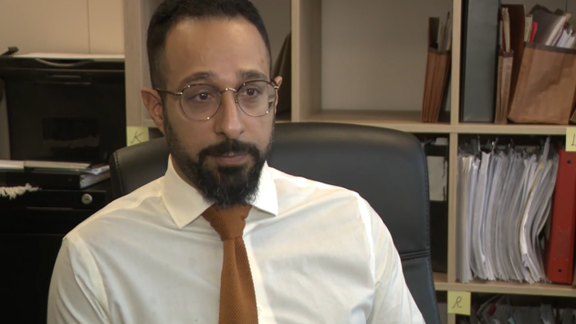
A group of Canadian, US and Iranian lawyers have launched a campaign to identify and take action against IRGC members and their affiliates living in Canada.

A group of Canadian, US and Iranian lawyers have launched a campaign to identify and take action against IRGC members and their affiliates living in Canada.
They have created a website called stopirgc.com to receive citizen reports and submit cases to government agencies and police to take action.
The Islamic Revolution Guard Corps or IRGC is the main branch of the Iranian military that defends the regime. It also controls most of the country’s military assets, including nuclear and missile programs.
Ramin Joubin, a Burnaby-based lawyer says over 100 cases in Canada are being investigated by the group.
“There are a lot of reports on family members of heads of state, or people who are high up in the current regime in Iran,” Joubin told Global News.
“They might be visiting, they might have a business, property, permanent residence or citizenship,” he added.
According to Joubin, they are also investigating cases of suspected money laundering, either from companies or individuals.
“A lot of the reports we’ve received are about business activities in Canada, but somehow bypassing sanctions and engaging in various types of money laundering.” said Joubin. “That is the biggest activity we are seeing by IRGC members and affiliates.”
In October, Ottawa barred some 10,000 IRGC members from entering Canada for life, as protests swept Iran following the death of Mahsa Amini in police custody.
Joubin, however, said the lifelong ban does not address IRGC officials, their affiliates and close family members, who already live inside the country.

Iran’s foreign minister claims that the West accuses Tehran of supplying drones to Russia to use against Ukraine, because it wants to “legitimize” its military assistance to Kiev.
In a phone conversation with UN Secretary-General Antonio Guterres, Hossein Amir-Abdollahian said that NATO’s decision to expand eastward was wrong and that was the root cause of the Ukraine war.
However, it is not clear from Iranian media reporting how Guterres reacted to the Iranian minister’s comments and in what context he made those comments.
Earlier, Amir-Abdollahian had acknowledged that Tehran “sold very few Iranian drones in the framework of defense cooperation with Russia 11 months before the start of the Ukraine war.”
He also warned that that Tehran believes diplomacy and dialogue are the best option, but the Islamic Republic will never be “tight-handed regarding other options.”
Russia has been using Iranian drones and missiles in its air attacks against Ukraine. In October, it targeted Ukraine’s civilian energy infrastructure, plunging it into blackouts as the winter cold began.
Amid international outcry over the Islamic Republic’s supply of drones and ballistic missiles for the Russian invasion, Ukrainian President Volodymyr Zelenskiy told a meeting of UN security council November 23, that the attacks are “an obvious crime against humanity” adding that Kyiv would put forward a resolution condemning “any forms of energy terror”.
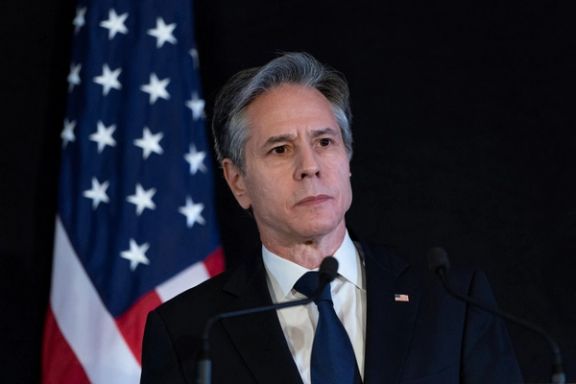
The United States on Friday designated China, Iran and Russia, among others, as countries of particular concern under the Religious Freedom Act over severe violations.
US Secretary of State Antony Blinken in a statement said those designated as countries of particular concern - which also include North Korea and Myanmar - engaged in or tolerated severe violations of religious freedom.
"Around the world, governments and non-state actors harass, threaten, jail, and even kill individuals on account of their beliefs," Blinken said in the statement.
"The United States will not stand by in the face of these abuses."
He added that Washington would welcome the opportunity to meet with all governments to outline concrete steps for removal from the lists.
Washington has increased pressure on Iran over the brutal crackdown on protesters. Women have waved and burned headscarves - mandatory under Iran's conservative dress codes - during the demonstrations that mark one of the boldest challenges to the Islamic Republic since the 1979 revolution.
The United Nations says more than 300 people have been killed so far and 14,000 arrested in protests.
United Nations experts have also called on Iran to stop persecution and harassment of religious minorities and end the use of religion to curtail the exercise of fundamental rights.
The Baha’i community is among the most severely persecuted religious minorities in Iran, with a marked increase in arrests and targeting this year, part of what the UN experts called broader policy of targeting dissenting beliefs or religious practices, including Christian converts and atheists.
Reporting by Reuters
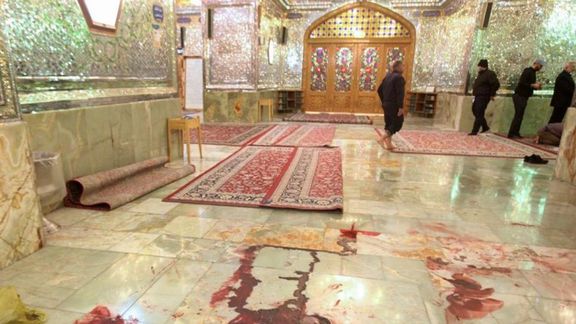
Hacked documents recently released have cast serious doubts on the official account of a terrorist attack on a shrine in Iran last month which claimed 15 victims.
The documents are several reports prepared by the IRGC’s media arm, Fars news agency, which were marked “top secret” indicate that the author believed at least parts of Iran's several intelligence organizations had knowledge of an imminent terrorist attack but did not take any action to stop it.
The documents were acquired by the hactivist group Black Reward recently which provided them to the media. These include both hearsay and excerpts from various media outlets on important political issues.
One of the reports says information provided by a Syrian group, Iran’s intelligence ministry had arrested three Taliban members who were planning terrorist operations on Shiite shrines.
The date of the arrest is not mentioned in the report which was written in the aftermath of the attack on Shahcheragh shrine in Shiraz on October 26.
Hours after the attack, Reuters quoted a statement from an ISIS telegram channel saying that the group claimed responsibility. ISIS also released a statement through its affiliated Amaq news agency and said one of its members had targeted groups of Shiite “infidels inside the shrine.”
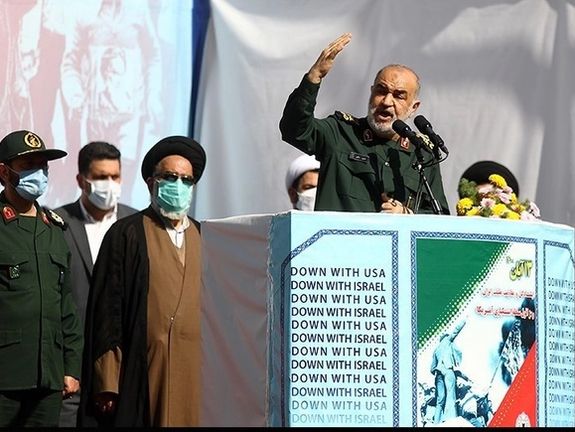
Many Iranians, however, have been very skeptical of the official account. They suspect the government of complicity with ISIS in the attack, to create its own narrative and martyrs to divert attention from fierce antigovernment protests.
The suspicion was partly due to the coincidence of the shooting with the 40th-day memorial for Mahsa Amini for which the opposition planned large widespread protests. Many also said this could be an excuse for blaming protesters for causing insecurity and justifying harsher suppression of their movement.
The author said some members of a terrorist group which was behind the Shiraz shooting had been arrested “several weeks before” with 18 kilos of explosives and recounted a rumor “in some political circles” about Salami’s decision to sack the IRGC commander of Shiraz.
He added, in different font, that the decision is believed to have been taken “because IRGC had prior knowledge of the attack on Shahcheragh”. The metadata of the document created November 11 indicates that this sentence was added by the author himself and was not a later addition by someone else.
The author of one of these secret documents wrote that the shooter, a citizen of Tajikistan, was taken down by an IRGC security agent who “happened to be present there for prayers.” The agent took his weapon from the lockers at the security gate, after hearing the shots, and rushed to encounter the shooter, he wrote, adding that the shooter had been to Afghanistan twice and taken the oath of loyalty to ISIS. He also wrote that even a police team that arrived at the shrine after the shooting had only been in the area for another operation.
According to the same document, the shooter was helped by an Afghan citizen residing in Tehran who stayed out of the shrine during the shooting and claims he was arrested in Tehran adding that the commander of the operation, a citizen of the Republic of Azerbaijan who had entered Iran legally on a visa, was also arrested on his way to Tehran.
According to another document also prepared for Salami’s attention, it has been claimed that the intelligence ministry had identified the Afghan member of the group who was arrested in Tehran “on the day of the incident” but did not announce the news “to gather more intelligence on the group.”
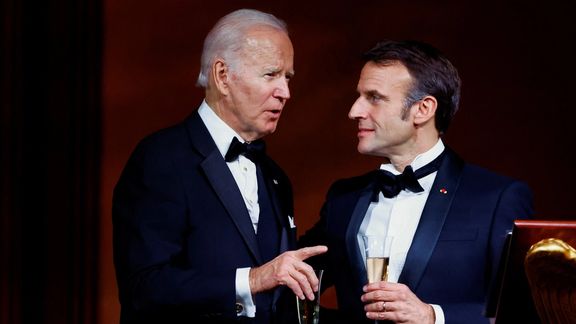
A joint statement marking French President Emmanuel Marcon’s visit to the White House expressed “respect for the Iranian people, in particular women and youth.”
With an array of celebrities at a red-carpeted state dinner Thursday, Secretary of State Antony Blinken told France 2 TV he would support the French team if the United States were knocked out of the World Cup. The joint presidential statement called France the US’s oldest ally.
The two countries were at one in supporting global human rights and in Middle East policy, the presidents’ statement said. This included a “just solution to the Syrian conflict,” where US troops remain in the north east, backing the Abrahamic Accords, by which some Arab states have recognized Israel ahead of Palestinian statehood, and a determination that “Iran can never develop or acquire a nuclear weapon.”
While the statement expressed commitment to “democratic values,” respect for international law, and international cooperation to address Iran’s “nuclear escalation,” the Washington political mood is increasingly polarizing the US and western Europe on one side, against Iran, China, and Russia on the other.
Republicans and Democrats are vying to push harder. Senator Mario Rubio, an advocate of more US weapons for Israel, Wednesday demanded that President Joe Biden look into whether the Chinese tech company Tiandy’s involvement in Iran “raises serious questions about whether its products are being used against peaceful Iranian protesters.”
‘Barbaric treatment’
In a 20-minute interview for CNN, former secretary of state Hillary Rodham Clinton envisaged US foreign policy as a struggle for women’s rights. Highlighting violations by Russia, Iran and the Afghan Taliban, Clinton called for an “absolute rejection of using sexual attack as a weapon of war,” for holding leaders accountable for “barbaric treatment,” and for stepping up sophisticated arms supplies to Ukraine, including from Israel, whose new government needed to understand “Iran and Russia have made an alliance.”
Clinton explained her approach as secretary of state to protests in Iran after the disputed 2009 presidential election as due to intelligence assessments that “overt American support would actually hurt” and that “behind the scenes” activity was better. “Now it’s very different, what’s happening now deserves our full-throated support,” she said.
“I would not be negotiating with Iran on anything right now, including the nuclear agreement,” Clinton continued. With the US withdrawal in 2018 from the 2015 Iran nuclear agreement, “that horse is out of the barn,” she said, while the International Atomic Energy Agency (IAEA) had lost its “eyes” on Iran’s nuclear program as Tehran reduced the agency’s access in response to US sanctions and attacks on its atomic sites.
Clinton suggested that maintaining US ‘maximum pressure’ sanctions was to force “regime change” but rather to spark “internal discussions” in Iran, “not just [within] the government … but [within] the clerics.” This tied in with Rob Malley, the White House special envoy for Iran, telling Foreign Policy magazine in an interview this week that “the Iranian system is divided.”
‘Active diplomatic track’
The Biden administration’s approach is not without critics. Much of the ‘global south’ is increasingly wary of US ‘exceptionalism,’ accusing the US of hypocrisy and double standards. The US-France presidents’ statement expressed support for the International Criminal Court, which Washington has refused to join. Both India and Pakistan abstained on the recent US-sponsored resolution condemning Iran at the IAEA governing board. South Africa and Brazil are among those refusing to take sides over Nato and Ukraine.
Nor is opposition to talks with Iran unanimous, in the US or Europe. In the Washington Post Thursday, Ellie Geranmayeh, of the European Council on Foreign Relations, argued for “an active diplomacy track to reverse Iran’s nuclear conduct before it is too late.” Rejecting the case for more and more sanctions, she argued there was “little evidence” they had worked, since Iran had “escalated its behavior” in response.
“It is irresponsible to risk everything on the hope that a peaceful transition of power will place Iran’s nuclear program under democratic and safe control anytime soon,” Geranmayeh wrote.
But the issue now is not just nuclear escalation. It is also the deadly violence the Islamic Republic is using against antigovernment protesters, which leaves little room for sanctions relief. More than 450 protesters have been killed since mid-September while several have been sentenced to death.

The extravagant presence of the Islamic Republic’s officials and propagandists in the World Cup in Qatar has enraged many Iranians, including some of the regime’s insiders.
Moeineddin Saeedi, a member of the Iranian parliament representing Chabahar, in the underprivileged province of Sistan and Baluchestan, said Thursday that “it is preposterous to send some people to Qatar with the nation's money."
He added that some officials justify the expenditure as means to promote “the Islamic Revolution,” noting that even if the purpose of such a measure was just, the people who should have been chosen should wisely.
According to different reports, between 100 to 350 people were given free tickets and accommodation to accompany the country’s soccer squad in the World Cup in Qatar as journalists and reporters. But they were not sent to report about the team. Their sole mission was to populate the stadiums and events on the sidelines of the World Cup as representatives of the Islamic Republic and make sure that no voices of dissent or news about the current protests would be reflected by foreign media. Some estimates put the amount spent on these so-called “cultural agents” as over 630 billion Iranian rials, or about $2 million.
The MP also called on the parliament’s cultural committee and other relevant committees to investigate how such people were selected and what were the justification for such a measure considering the current situation in the country.
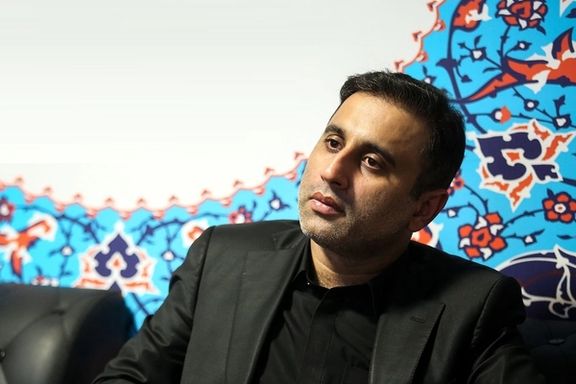
“At least those who know the English alphabet should have gone,” he quipped, in reference to a video of two Iranian women that went viral because of their embarrassingly low level of English proficiency when speaking with foreign media. One of the women, who later turned out to be the deputy director general for foreign media of the Islamic Republic Ministry of Culture and Islamic Guidance, was asked by a foreign correspondent about developments inside Iran, in which she could only utter “because” and “in Iran” in English and continued to answer the reporter in ineloquent Persian. The other one, one of the managers of Fars News Agency – a media network affiliated with Revolutionary Guard – intervened to help her friend. She said, “We slow the problem,” while she meant to say "We solve the problems,” referring to the ongoing antigovernment protests.
People on social media immediately started to make fun of them naming them “Mrs. Because and Mrs. Slow,” and created numerous dubsmash videos or music remixes of the footage. Despite their sheer lies about equality between men and women in Iran, the thing that made the video to go viral was their level of English comprehension and conversation, irking some regime insiders that such people are chosen to represent them in an international arena such as the World Cup.
Islamic Republic’s Football Federation has said that in addition to the country’s officials and state media reporters, more than 22,000 free tickets -- about 7,000 per match -- have been provided for the country’s cherrypicked supporters to go to Qatar from Iran. Moreover, there are videos and photos of Bangladeshi and Pakistani citizens – reportedly workers who helped built Qatar’s stadiums under inhumane working conditions – paid to pose as Iranian football fans, carrying the Islamic Republic’s flags.